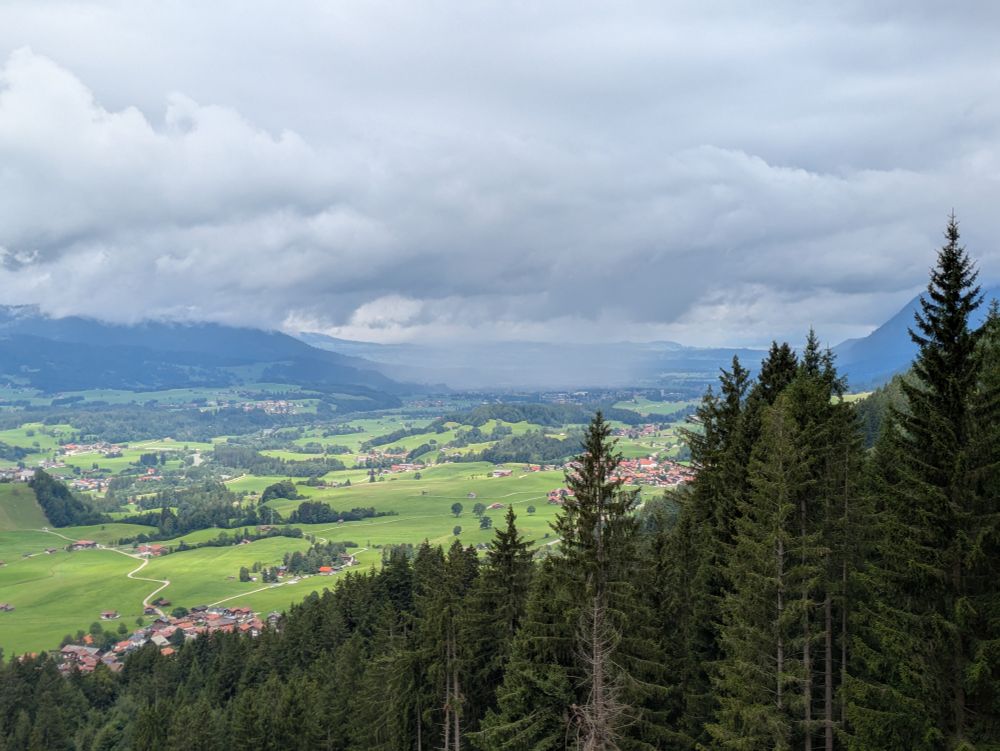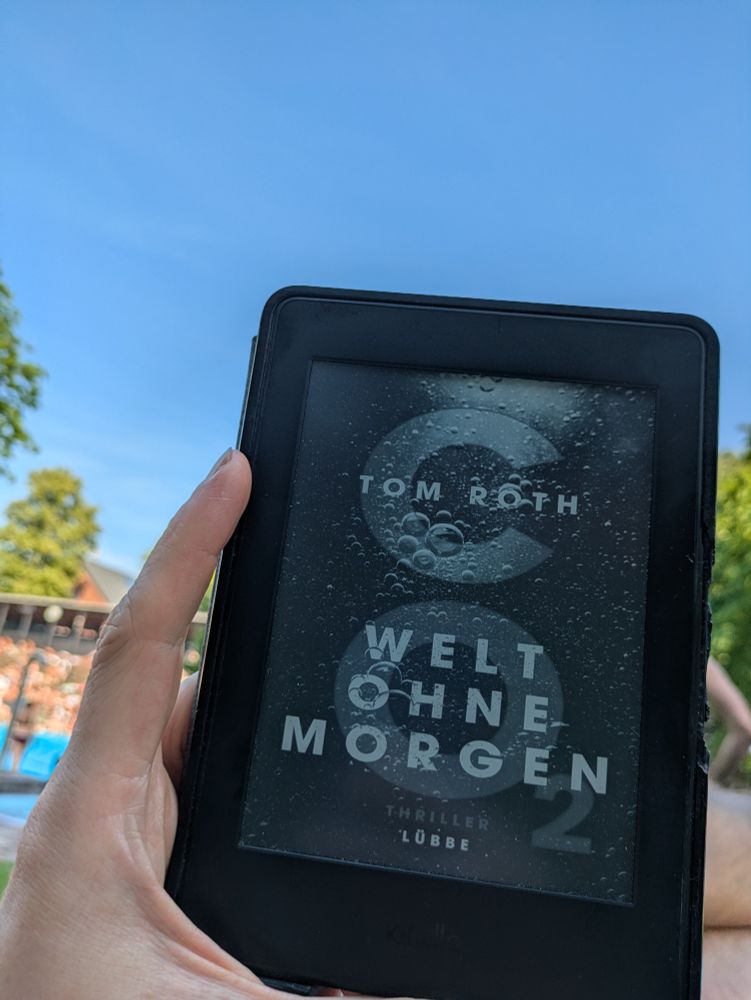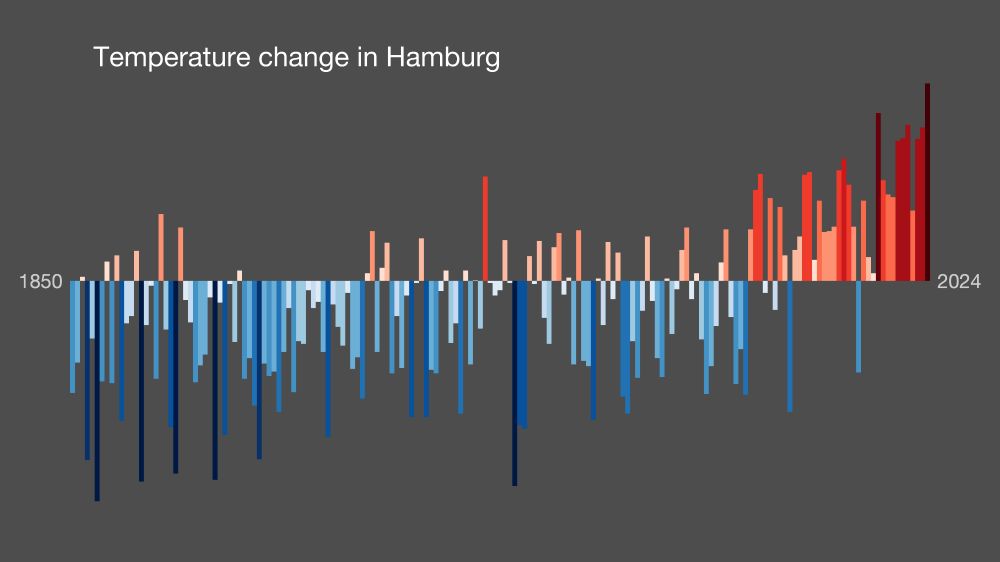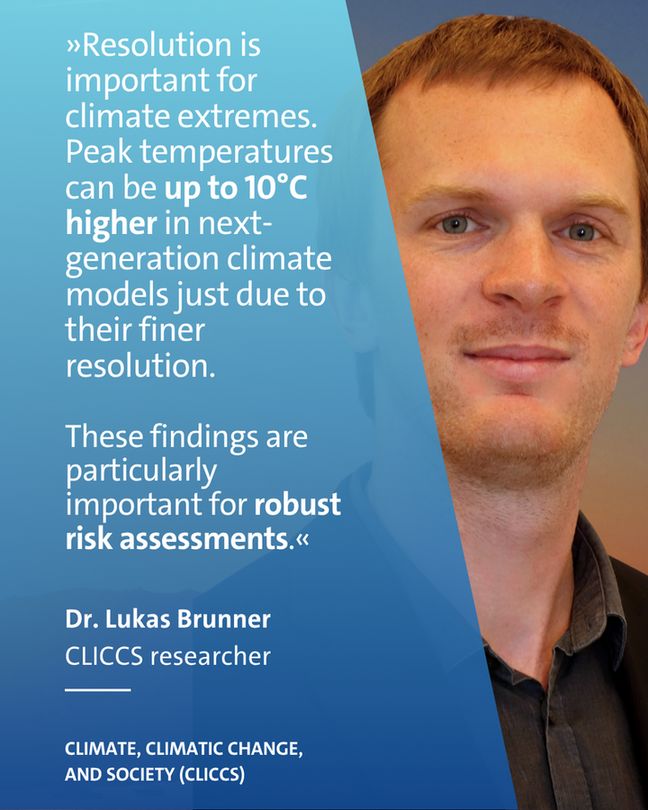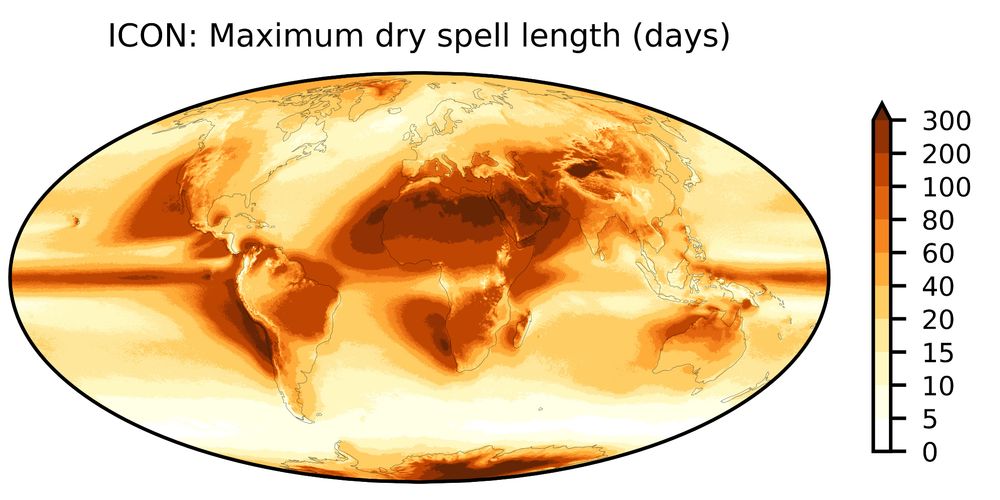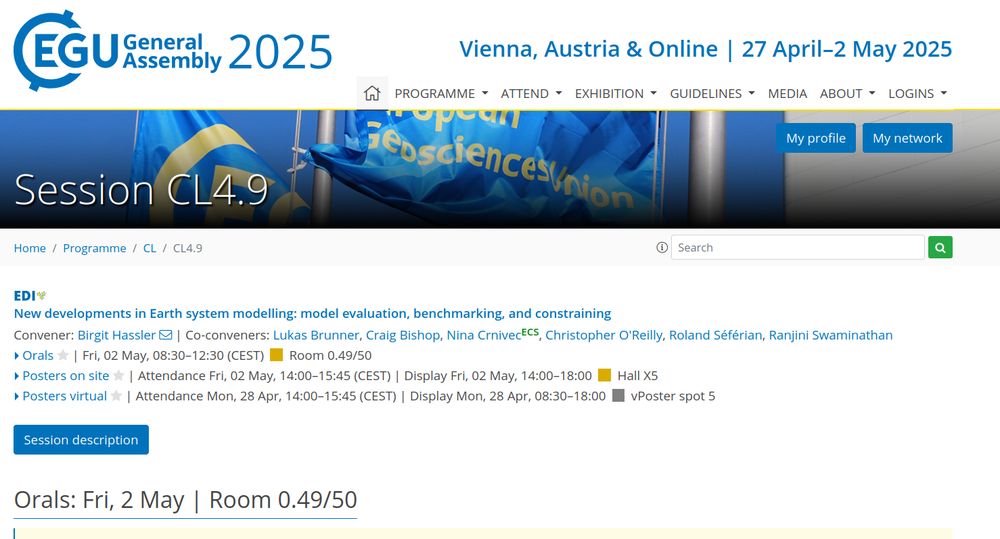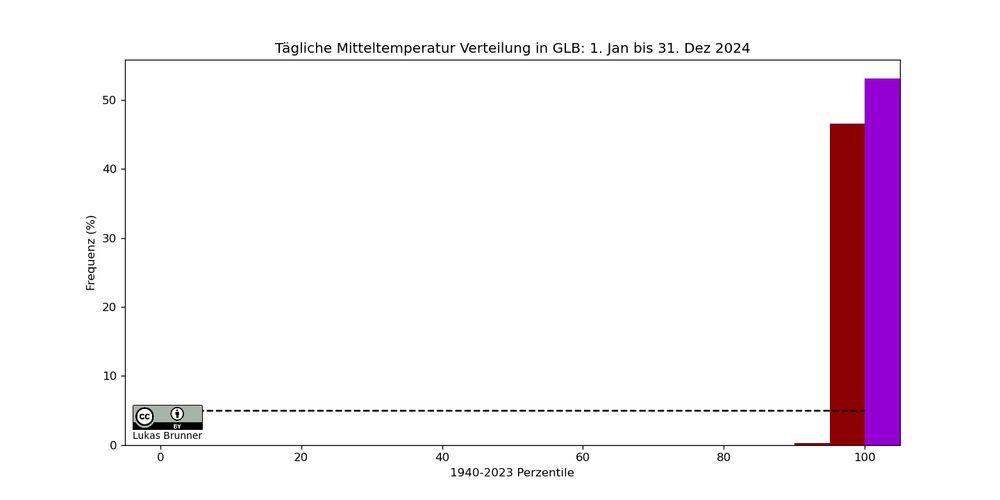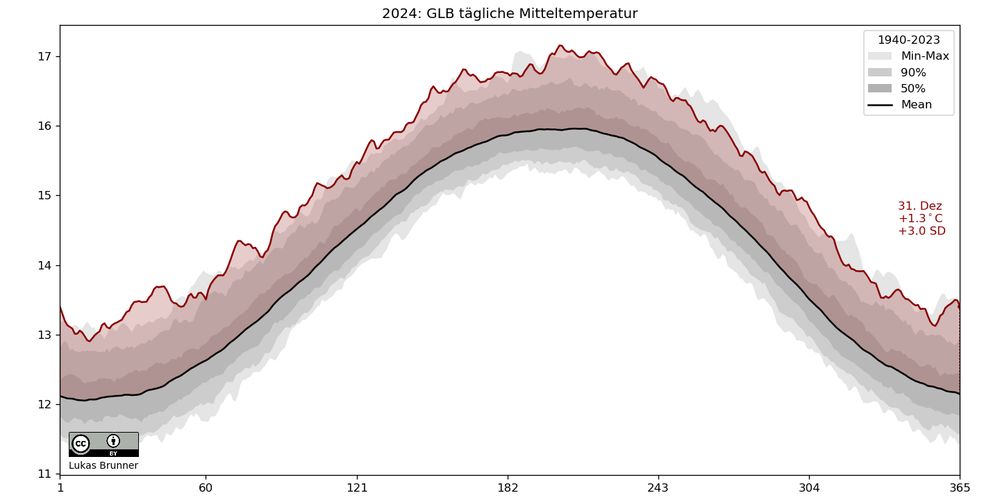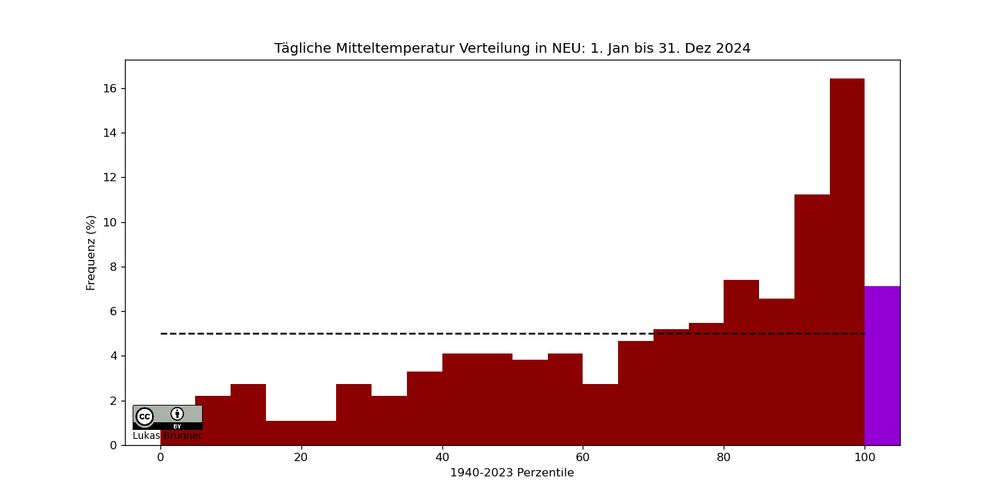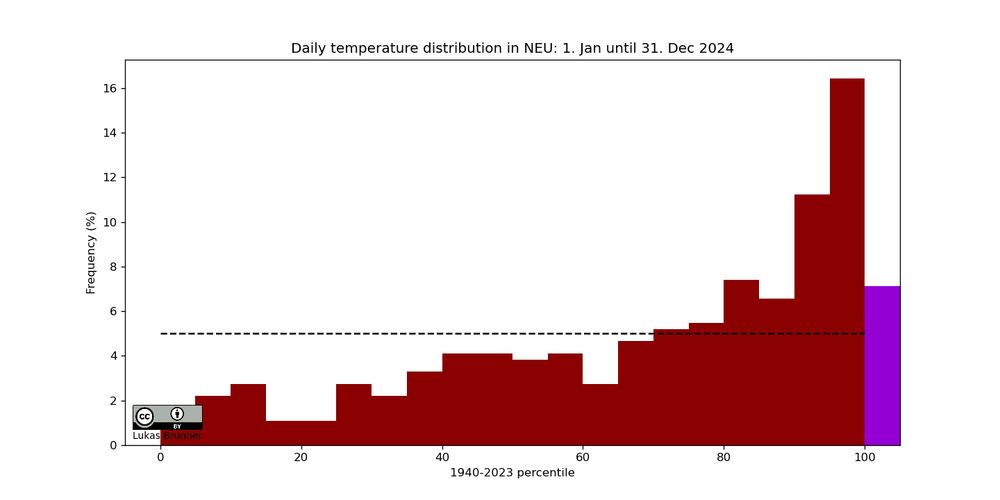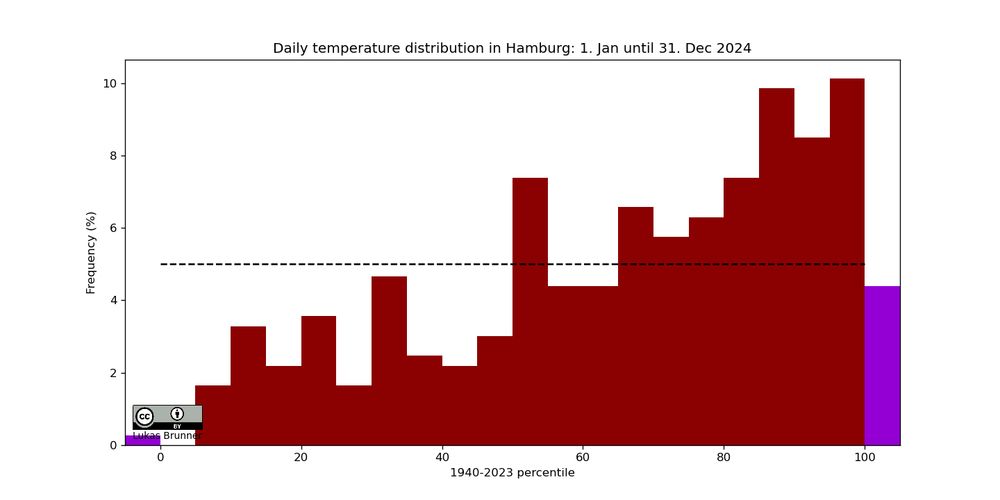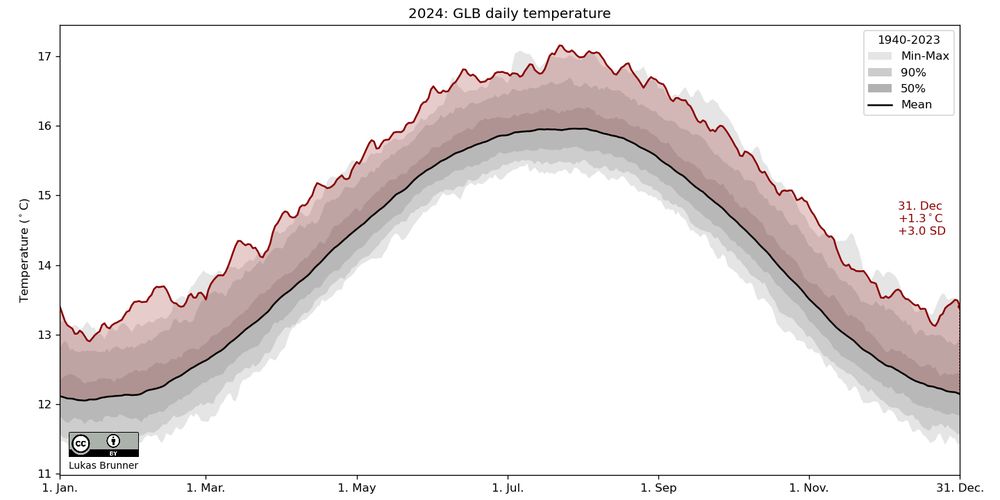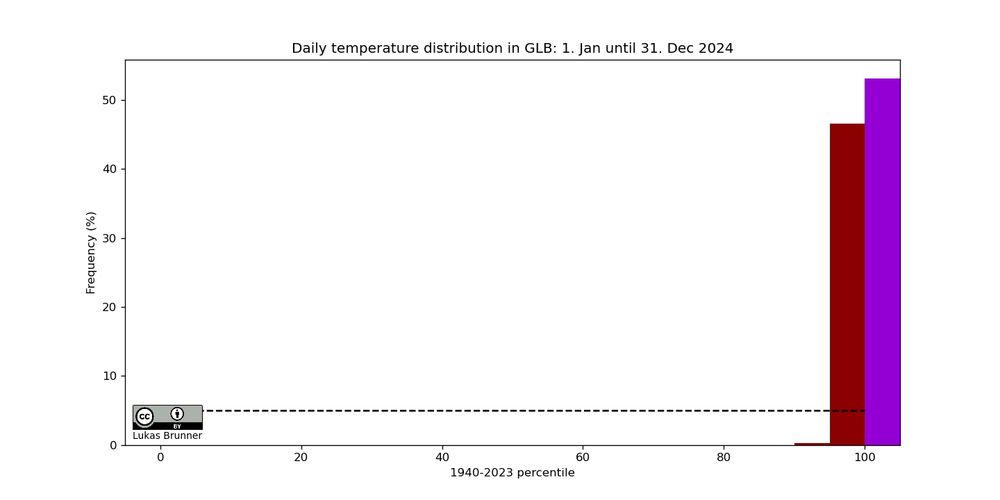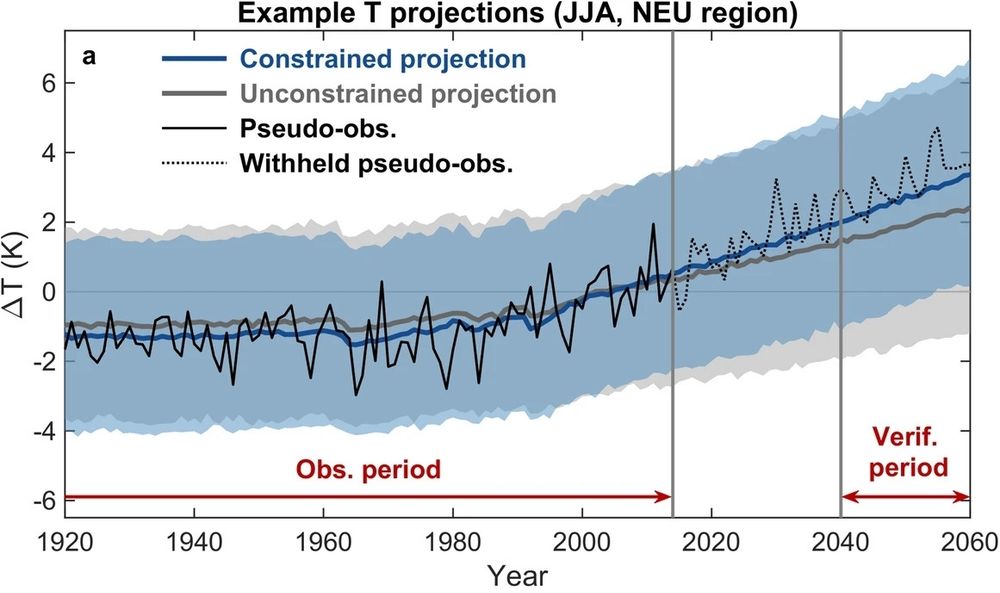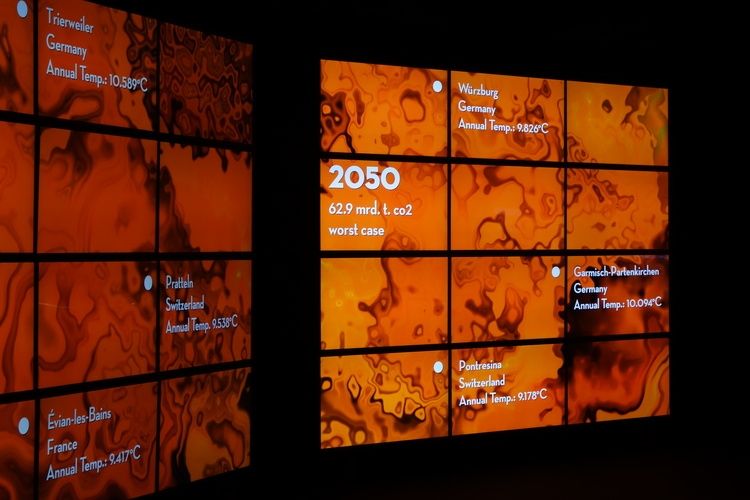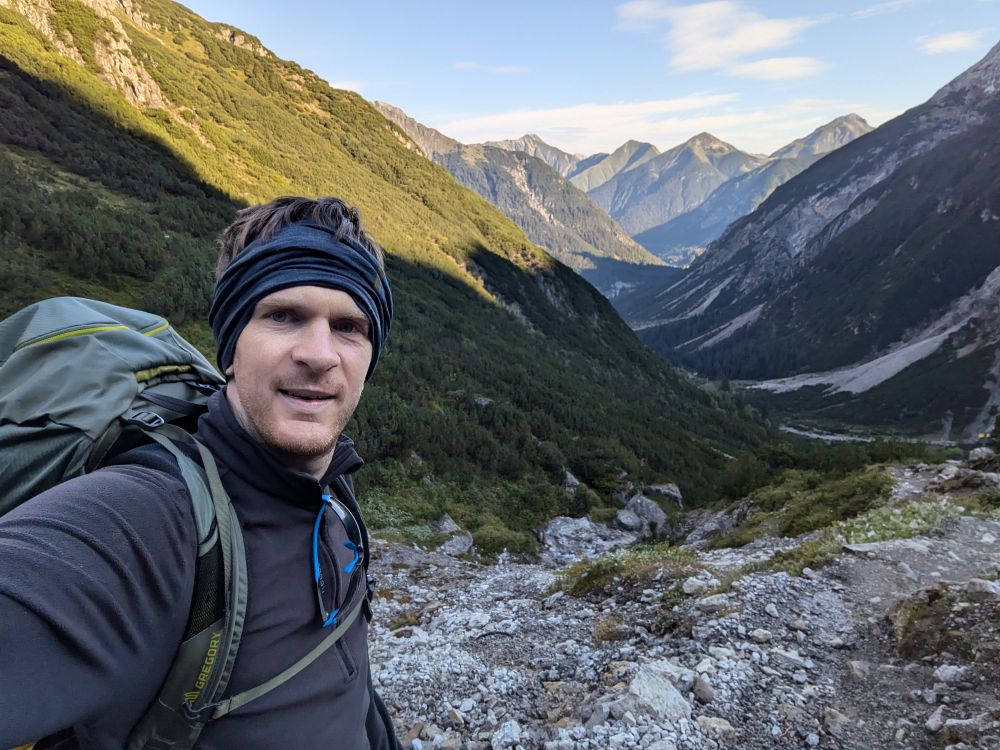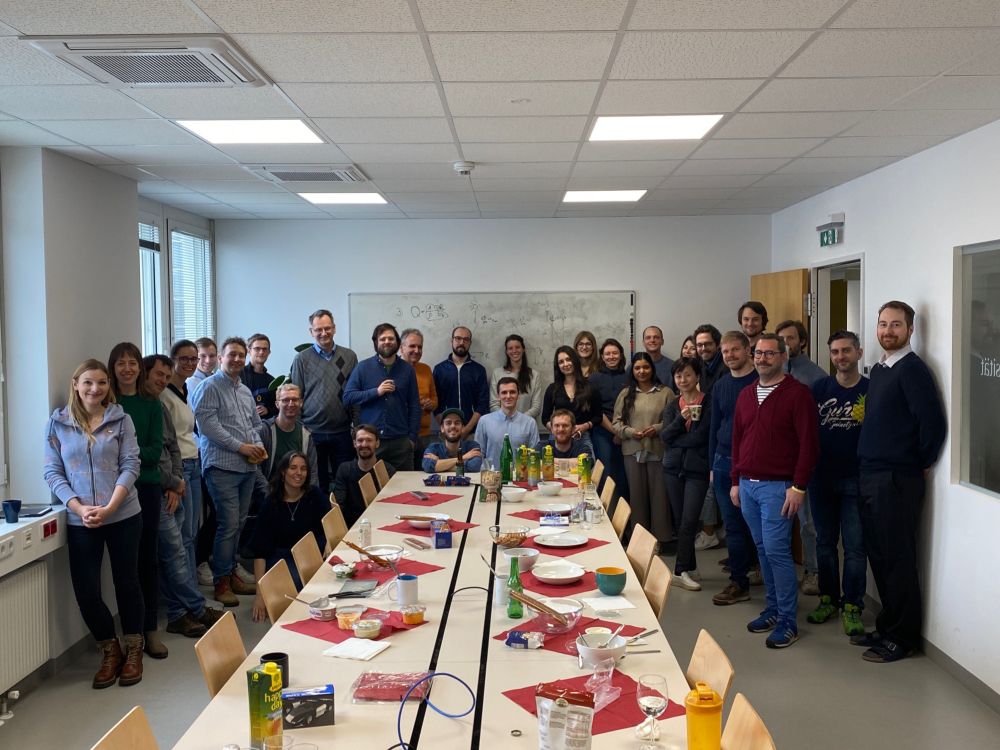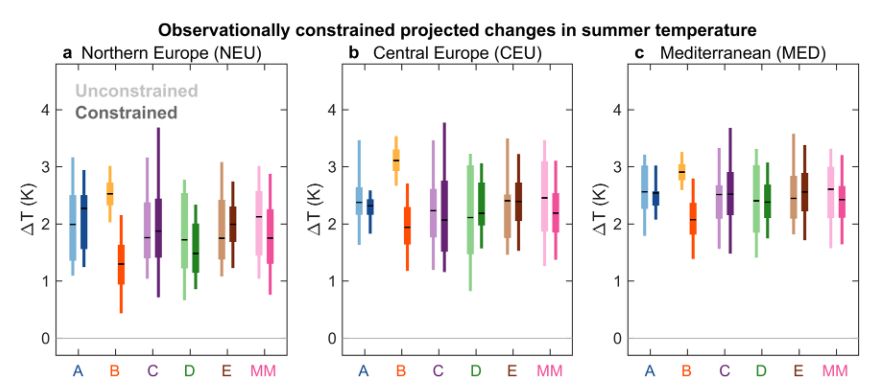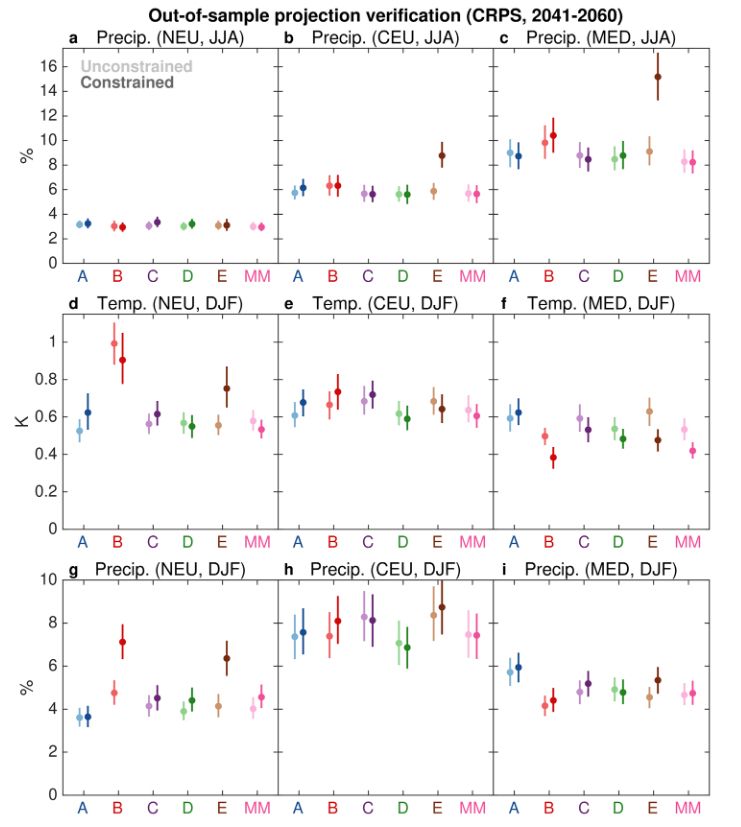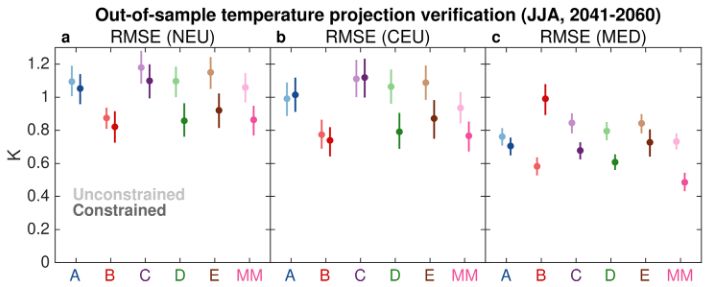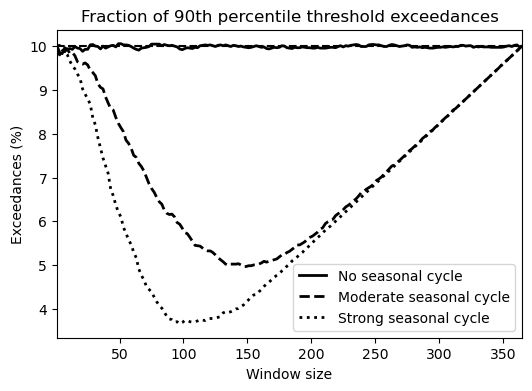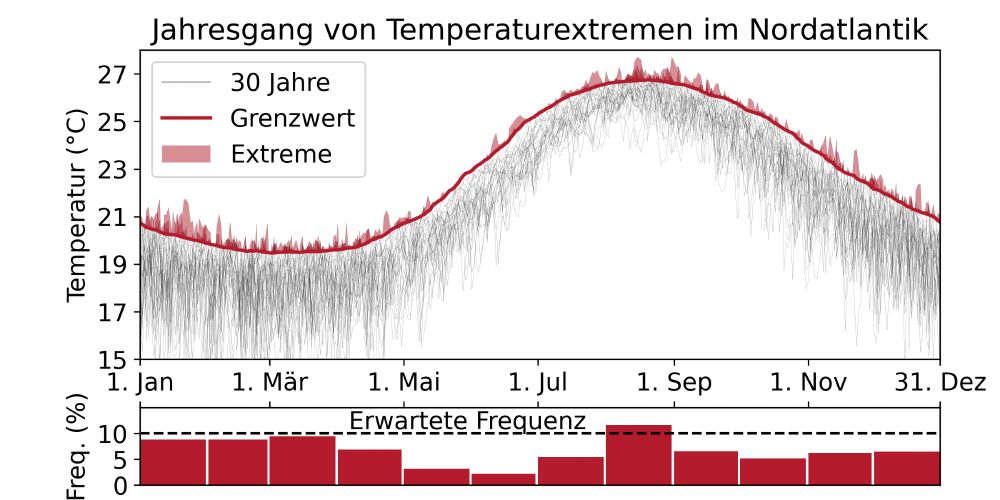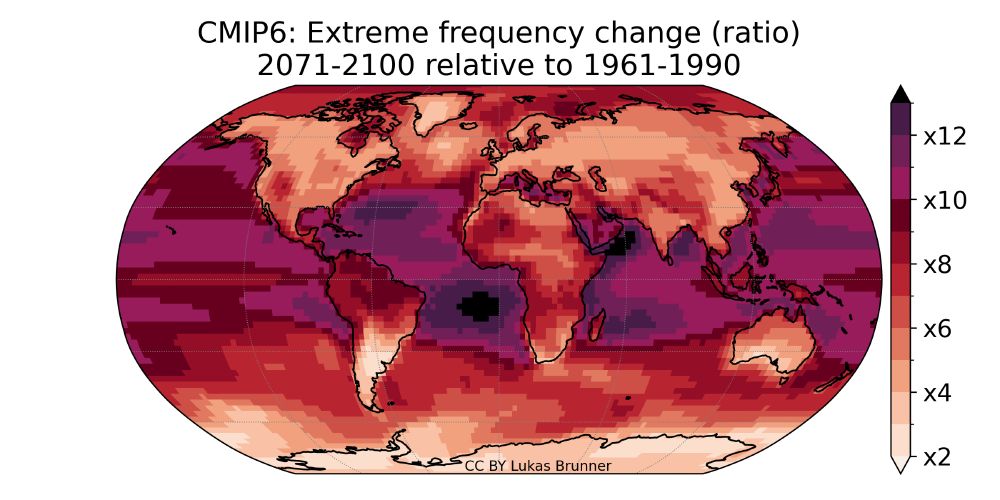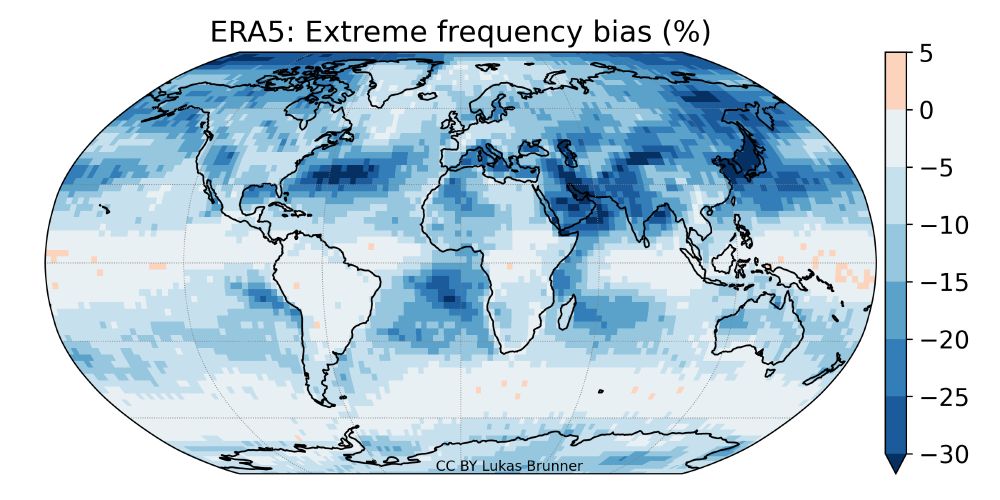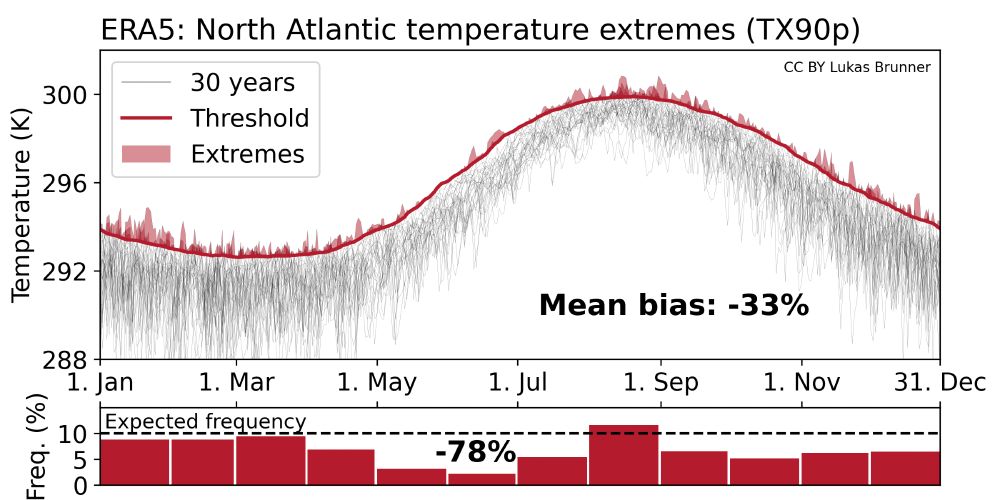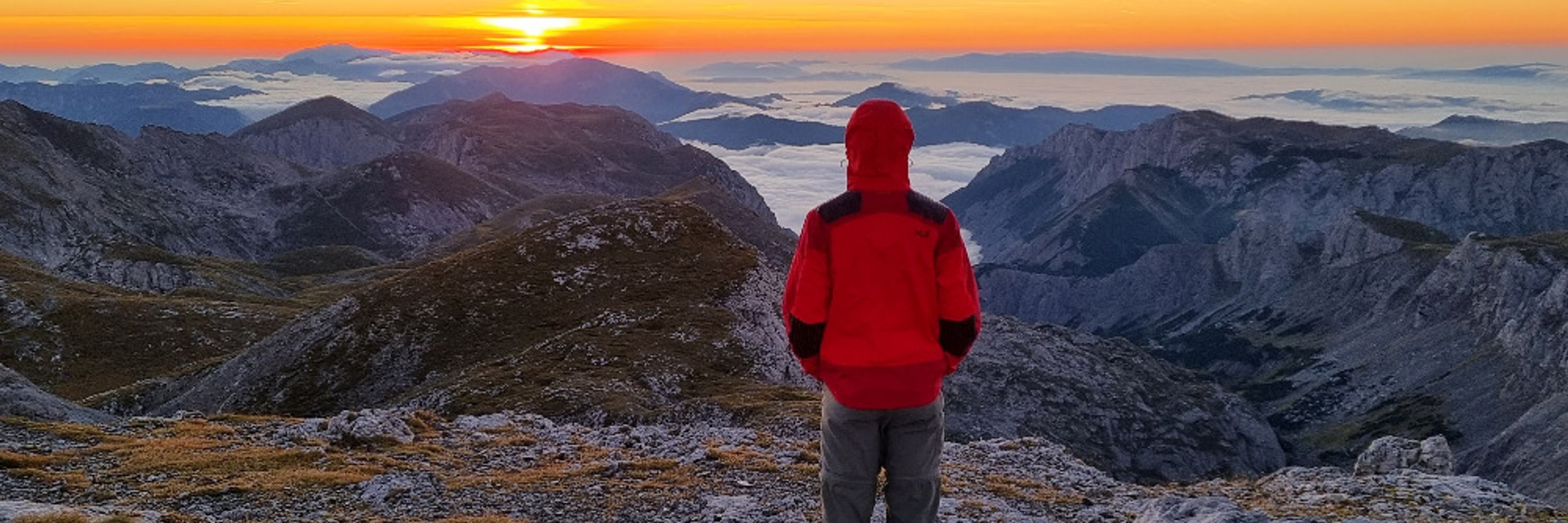

Lukas Brunner
@lukasbrunner.bsky.social
Climate scientist @uni-hamburg.de: future projections, extremes, uncertainties | Formerly @ethz.ch @univie.ac.at | PhD @uni-graz.at | Python nerd | Hiking enthusiast #SystemChangeNotClimateChange #OpenScience More: https://lukasbrunner.github.io
created October 3, 2023
723 followers 315 following 98 posts
view profile on Bluesky Posts
 Lukas Brunner (@lukasbrunner.bsky.social)
Lukas Brunner (@lukasbrunner.bsky.social)
Comparing global km-scale climate models to the resolution of coarser CMIP6 models. The video shows precipitation flux and accumulated precipitation for 2025, ending with a quantification of the difference in resolutions. Animation: Michael Böttinger (DKRZ) Method & paper: bsky.app/profile/luka...
 Lukas Brunner (@lukasbrunner.bsky.social) reply parent
Lukas Brunner (@lukasbrunner.bsky.social) reply parent
See also the amazing visualization made by DKRZ based on our work 👇👇 bsky.app/profile/luka...
 Lukas Brunner (@lukasbrunner.bsky.social)
Lukas Brunner (@lukasbrunner.bsky.social)
Here's also my thread on the main findings: /profile/lukasbrunner.bsky.social/post/3lrsdhwkev22y
 Lukas Brunner (@lukasbrunner.bsky.social) reply parent
Lukas Brunner (@lukasbrunner.bsky.social) reply parent
Here is the thread to the original publication: bsky.app/profile/luka...
 Lukas Brunner (@lukasbrunner.bsky.social)
Lukas Brunner (@lukasbrunner.bsky.social)
Amazing visualization of our recent sub-grid variability work by Michael Böttinger (DKRZ) 🤩. It shows the local detail in global precipitation resolved by km-scale models. From 0:50 in direct comparison to CMIP6-type 100km. From 2:07 the sub-grid variability is shown. 🤓🧪 youtu.be/fzA92tSF4ZM?...
 Lukas Brunner (@lukasbrunner.bsky.social)
Lukas Brunner (@lukasbrunner.bsky.social)
Local downpour near Oberstdorf, Germany ⛰️
 Lukas Brunner (@lukasbrunner.bsky.social) reply parent
Lukas Brunner (@lukasbrunner.bsky.social) reply parent
Mehr zum Format und zukünftigen Vorlesungen: www.uni-hamburg.de/wissen-fuer-...
 Lukas Brunner (@lukasbrunner.bsky.social)
Lukas Brunner (@lukasbrunner.bsky.social)
Vor einigen Wochen durfte ich im Rahmen des Formats Vorlesung für Alle der @uni-hamburg.de einen Vortrag zu Temperaturextremen geben. Die Aufzeichnung ist jetzt auf YouTube 👇 Danke für die Einladung und das Interesse! youtu.be/0KGi4Y6J2Ls?...
 Lukas Brunner (@lukasbrunner.bsky.social) reposted
Lukas Brunner (@lukasbrunner.bsky.social) reposted
New paper in ERL! We study the importance of resolution for the representation of climate extremes. We use a new generation of km-scale models to show that many important details about temperature and precipitation extremes are hidden at CMIP6-like resolutions. doi.org/10.1088/1748...
 Katharine Hayhoe (@katharinehayhoe.com) reposted
Katharine Hayhoe (@katharinehayhoe.com) reposted
Today is #ShowYourStripes Day! Created by @edhawkins.org, the warming stripes show temperature each year: blue for cool, white for avg, red for hot. Athletes are wearing them, knitters are knitting them, and cities are putting them on trams. Find + share your "stripes" here: showyourstripes.info
 Lukas Brunner (@lukasbrunner.bsky.social)
Lukas Brunner (@lukasbrunner.bsky.social)
Annually the impact of climate change is pretty clear even locally. And even on a daily basis the signal starts to emerge! For regular updates on daily Hamburg temperatures in a long term context, check out my bot @weather-climate.bsky.social (still 🚧) 2025 so far: bsky.app/profile/weat...
 Lukas Brunner (@lukasbrunner.bsky.social) reply parent
Lukas Brunner (@lukasbrunner.bsky.social) reply parent
Scary but fitting read for the occasion 🫣
 Lukas Brunner (@lukasbrunner.bsky.social)
Lukas Brunner (@lukasbrunner.bsky.social)
Temperature anomaly relative to 1951-2010 in Hamburg, Germany #ShowYourStripes day #SystemChangeNotClimateChange
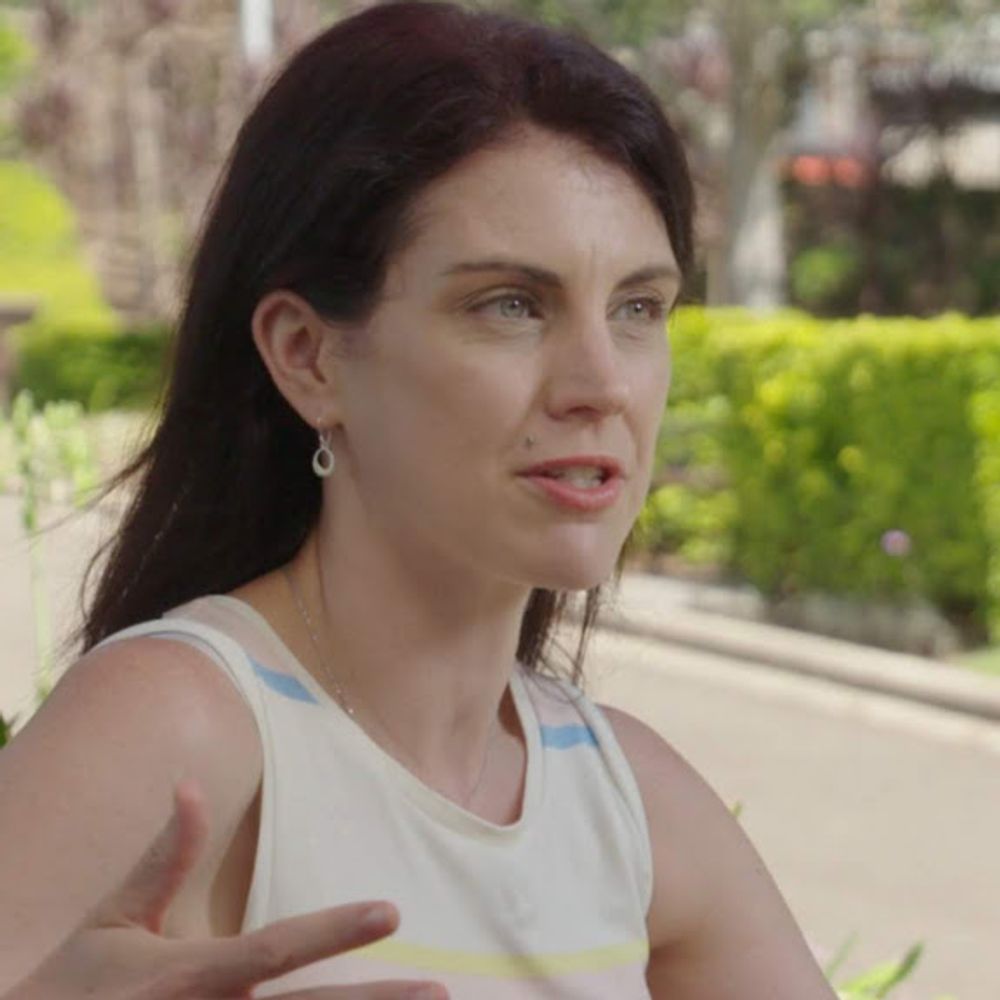 Sarah Perkins-Kirkpatrick (@sarahinscience.bsky.social) reposted
Sarah Perkins-Kirkpatrick (@sarahinscience.bsky.social) reposted
The first 3 eps of TOTALLY COOKED have landed! Check it out for weather & climate in a factual, relatable & often humorous way. Available below, & where you get your podcasts. Like, follow & share. Let's tackle the climate crisis together. #totallycooked www.21centuryweather.org.au/engage/total...
 Lukas Brunner (@lukasbrunner.bsky.social) reply parent
Lukas Brunner (@lukasbrunner.bsky.social) reply parent
The repository is hierarchical. Click on the rightmost tab, there you can select one of the two models, and then again one of the two resolutions. At the lowest level, there is a green 'Download' button. Here's a direct link to the high-resolution IOCN results: www.wdc-climate.de/ui/entry?acr...
 Lukas Brunner (@lukasbrunner.bsky.social)
Lukas Brunner (@lukasbrunner.bsky.social)
@cenunihh.bsky.social climate visualization lab has created this nice animation of the resolution effect on climate extremes! 🤩 Comparison of CMIP6-like 100km and the new 10km for the example of TXx (hottest day in the year). Details in the paper: doi.org/10.1088/1748... youtu.be/R5laSSVHUAk?...
 CEN University of Hamburg (@cenunihh.bsky.social) reposted
CEN University of Hamburg (@cenunihh.bsky.social) reposted
Resolution matters: Extreme temperatures in e.g. Indian cities can be underestimated by up to 10°C, a paper by @lukasbrunner.bsky.social shows. High-res climate models (<10 km) reveal that important details about extremes are hidden at lower resolutions. iopscience.iop.org/article/10.1...
 Lukas Brunner (@lukasbrunner.bsky.social) reply parent
Lukas Brunner (@lukasbrunner.bsky.social) reply parent
We are working on related topics right now but I can't make any specific promises at this point. Having said that: we have published all the data that go into our study as netCDF (thats annual extreme indices from 2021-2049)👇 bsky.app/profile/luka...
 Lukas Brunner (@lukasbrunner.bsky.social) reply parent
Lukas Brunner (@lukasbrunner.bsky.social) reply parent
@erichfischer.bsky.social @omartius.bsky.social @janasillmann.bsky.social @uni-hamburg.de @cenunihh.bsky.social @ioppublishing.bsky.social
 Lukas Brunner (@lukasbrunner.bsky.social) reply parent
Lukas Brunner (@lukasbrunner.bsky.social) reply parent
An extensive database of plots for all ETCCDI climate extreme indices is also available under a CC BY license on Zenodo: doi.org/10.5281/zeno...
 Lukas Brunner (@lukasbrunner.bsky.social) reply parent
Lukas Brunner (@lukasbrunner.bsky.social) reply parent
The code we used to produce our figures is freely available under a permissive license. If you want to work with it and have any questions, feel free to reach out to me. There are also open master’s thesis projects on the topic! github.com/lukasbrunner...
 Lukas Brunner (@lukasbrunner.bsky.social) reply parent
Lukas Brunner (@lukasbrunner.bsky.social) reply parent
We focus on a subset of the 27 ETCCDI climate extreme indices in the paper. But we have published the full set of ETCCDI indices with 10km resolution globally at the World Data Center for Climate here: doi.org/10.26050/WDC...
 Lukas Brunner (@lukasbrunner.bsky.social) reply parent
Lukas Brunner (@lukasbrunner.bsky.social) reply parent
We calculate extreme indices from two ~10km models (ICON & IFS). From them we quantify what information is lost at CMIP6-like resolutions of ~100km. To do so we introduce the concepts of sub-grid variability and sub-grid anomaly. Details in the paper: iopscience.iop.org/article/10.1...
 Lukas Brunner (@lukasbrunner.bsky.social)
Lukas Brunner (@lukasbrunner.bsky.social)
New paper in ERL! We study the importance of resolution for the representation of climate extremes. We use a new generation of km-scale models to show that many important details about temperature and precipitation extremes are hidden at CMIP6-like resolutions. doi.org/10.1088/1748...
 Laura Suarez-Gutierrez (@drlaurasuarez.bsky.social) reposted
Laura Suarez-Gutierrez (@drlaurasuarez.bsky.social) reposted
#EGU25 is about to start! If you're there, check out our session on High-impact Climate Extremes on Tuesday, room 🟨 F1 🧪: meetingorganizer.copernicus.org/EGU25/sessio... With many exciting talks, including the CL Division Outstanding ECS Award Lecture by @kornhuber.bsky.social
 Lukas Brunner (@lukasbrunner.bsky.social)
Lukas Brunner (@lukasbrunner.bsky.social)
Great workshop on atmospheric temperature changes by @wcrpclimate.bsky.social in Graz! Thanks for including me in this interesting and insightful exchange!
 Lukas Brunner (@lukasbrunner.bsky.social) reposted
Lukas Brunner (@lukasbrunner.bsky.social) reposted
Let me very warmly recommend putting our Up-Goer Five session into your EGU25 calendar! I mean, just have a look at these amazing abstract titles (using only the 1000 most used English words). I can guarantee that this will be an extremely informative and fun session! 🤓🧑🎓 #EGU25 @egu.eu
 Lukas Brunner (@lukasbrunner.bsky.social)
Lukas Brunner (@lukasbrunner.bsky.social)
Join us on Friday during #EGU25 for an interesting session on New developments in Earth system modelling! We will cover various topics from advances in modelling to model evaluation. We are also honored to have Shuting Yang as a solicited speaker! 👇 meetingorganizer.copernicus.org/EGU25/sessio...
 Mariana Madruga de Brito (@mdebrito.bsky.social) reposted
Mariana Madruga de Brito (@mdebrito.bsky.social) reposted
This is genius! so creative and also important for how we communicate our science
 Vikki Thompson (@vikkithompson.bsky.social) reposted
Vikki Thompson (@vikkithompson.bsky.social) reposted
Super excited to be presenting our ensemble boosting work, 'Imagine rain falling in a different place', in this session:
 Lukas Brunner (@lukasbrunner.bsky.social)
Lukas Brunner (@lukasbrunner.bsky.social)
Let me very warmly recommend putting our Up-Goer Five session into your EGU25 calendar! I mean, just have a look at these amazing abstract titles (using only the 1000 most used English words). I can guarantee that this will be an extremely informative and fun session! 🤓🧑🎓 #EGU25 @egu.eu
 Lukas Brunner (@lukasbrunner.bsky.social)
Lukas Brunner (@lukasbrunner.bsky.social)
In 2025 so far almost 20% of days in Hamburg have been warmer than the 90th percentile of the 1940-2024 climatology. More than 60% have been warmer than the mean.
 Lukas Brunner (@lukasbrunner.bsky.social)
Lukas Brunner (@lukasbrunner.bsky.social)
Apply for a scholarship for the European Forum Alpbach! Great opportunity for interesting discussions beyond topical silos. 🗣️🌎 There are several options for scholarships, if you are connected to Vorarlberg consider applying here: www.club-alpbach-vorarlberg.at/bewerbungspr...
 Lukas Brunner (@lukasbrunner.bsky.social) reply parent
Lukas Brunner (@lukasbrunner.bsky.social) reply parent
I'm so sorry to hear that! You're one of the best and most active communicators we have, don't let anyone tell you anything else!
 Klimadashboard (@klimadashboard.bsky.social) reposted
Klimadashboard (@klimadashboard.bsky.social) reposted
Zum dreijährigen Geburtstag haben wir Klimadashboard.at und Klimadashboard.de neu gestaltet und mit vielen neuen Features ausgestattet: 💥 neues Design 📬 aktuelle Klimaberichterstattung 🇬🇧 english translations 🌚 dark mode 🚀 ...und vieles mehr!
 Katie Mack (@astrokatie.com) reposted
Katie Mack (@astrokatie.com) reposted
On the migration of the scientific community to Bluesky: www.nature.com/articles/d41... 🧪
 Lukas Brunner (@lukasbrunner.bsky.social)
Lukas Brunner (@lukasbrunner.bsky.social)
Thanks for joining here!
 Lukas Brunner (@lukasbrunner.bsky.social) reply parent
Lukas Brunner (@lukasbrunner.bsky.social) reply parent
Ich nehme das 'fast' zurück... 2024 waren alle Tage wärmer als das 90. Perzentil des jeweils gleichen Tages im Jahr.
 Lukas Brunner (@lukasbrunner.bsky.social) reply parent
Lukas Brunner (@lukasbrunner.bsky.social) reply parent
Entsprechend langweilig sieht die Verteilung der globalen Temperatur im Kontext der bisherigen Verteilung 1940-2023 aus... In einem stabilen Klima würden wir über die gesamte Breite rote Balken erwarten, die alle etwa so hoch sind wie die horizontale schwarze Linie. 🥵
 Lukas Brunner (@lukasbrunner.bsky.social) reply parent
Lukas Brunner (@lukasbrunner.bsky.social) reply parent
Die globale Temperatur ist deutlich weniger variabel und liegt während des gesamten Jahres 2024 fast ausschließlich über dem 90. Perzentil, wobei etwa die Hälfte der Tage einen neuen Hitzerekord aufstellt.
 Lukas Brunner (@lukasbrunner.bsky.social) reply parent
Lukas Brunner (@lukasbrunner.bsky.social) reply parent
Wenn wir herauszoomen und auf ganz Nordeuropa schauen steigt die Zahl der Tage mit Hitzeextrem sogar auf in Drittel! Etwa 7% der Tage waren wärmer als der gleiche Tag im Jahr im gesamten ERA5 Datensatz.
 Lukas Brunner (@lukasbrunner.bsky.social) reply parent
Lukas Brunner (@lukasbrunner.bsky.social) reply parent
Looking at the region of Northern Europe its somewhere between local and global and a bit more than a third of the days exceeds the 90th percentile.
 Lukas Brunner (@lukasbrunner.bsky.social) reply parent
Lukas Brunner (@lukasbrunner.bsky.social) reply parent
Der Eindruck täuscht (leider) auch nicht: wenn wir die Temperaturverteilung in Hamburg 2024 im Vergleich zu 1940-2023 ansehen, finden wir fast ein Viertel aller Tage, die über dem 90. Perzentil liegen und damit die Definition für ein Hitzeextrem erfüllen.
 Lukas Brunner (@lukasbrunner.bsky.social)
Lukas Brunner (@lukasbrunner.bsky.social)
Klima ist was wir erwarten, Wetter ist was passiert. Aber der Klimawandel verändert immer weiter was wirklich passiert selbst lokal. Die tägliche Temperatur in Hamburg 2024 ist zwar sehr variabel aber klar zu warm wenn wir sie mit der Verteilung 1940-2023 vergleichen.
 Lukas Brunner (@lukasbrunner.bsky.social) reply parent
Lukas Brunner (@lukasbrunner.bsky.social) reply parent
Data from @ecmwf.bsky.social ERA5. Follow my bot @weather-climate.bsky.social for regular updates and see there for details on the methodology.
 Lukas Brunner (@lukasbrunner.bsky.social) reply parent
Lukas Brunner (@lukasbrunner.bsky.social) reply parent
Climate is what you expect and weather is what you get, but climate change is increasingly changing what we get, even locally. Here is where the temperatures fell in the 1940-2023 distribution for Hamburg, Germany. Almost a quarter exceeds the 90th percentile and can be considered extreme. 🤒
 Lukas Brunner (@lukasbrunner.bsky.social)
Lukas Brunner (@lukasbrunner.bsky.social)
The 2024 climate summary reports are out and records are falling left and right. I'm adding this as I haven't seen it anywhere else: globally all days were warmer than the 90th percentile of the 1940-2023 distribution and more than half set a new record compared to the same day in previous years. 🥵
 Lukas Brunner (@lukasbrunner.bsky.social) reply parent
Lukas Brunner (@lukasbrunner.bsky.social) reply parent
I started this session last year as I felt the topic was not really covered at EGU and it was super interesting to hear all the different approaches presented! So even if you are not presenting consider joining and listening in to what will certainly be a very informative session again!
 Lukas Brunner (@lukasbrunner.bsky.social)
Lukas Brunner (@lukasbrunner.bsky.social)
The #EGU25 abstract deadline is approaching (Wednesday January 15th 1pm CET). If you are still looking for a session and work on evaluating climate models and/or observational constraints for their future projections, check out our session here: meetingorganizer.copernicus.org/EGU25/sessio...
 Lukas Brunner (@lukasbrunner.bsky.social)
Lukas Brunner (@lukasbrunner.bsky.social)
Are you working on climate model evaluation/improving future projections & their uncertainties at different scales? Join us at #EGU25 for an interesting session on Aggregating and constraining multi-model ensembles! meetingorganizer.copernicus.org/EGU25/sessio...
 Karsten Schwanke (@kschwanke.bsky.social) reposted
Karsten Schwanke (@kschwanke.bsky.social) reposted
Hier nochmal zum Nachgucken: Mein Jahresrückblick zum Wetter und Klima 2024.
 Lukas Brunner (@lukasbrunner.bsky.social) reply parent
Lukas Brunner (@lukasbrunner.bsky.social) reply parent
Pictures: - Paper on an error in temperature extreme metrics: bsky.app/profile/luka... - Paper on comparison of model evaluation & constraining methods: bsky.app/profile/luka... - Future of the Earth theatre: lukasbrunner.github.io/misc/tfote - Alpine crossing 2024 🏔️ / Hanauer Hütte 🇦🇹
 Lukas Brunner (@lukasbrunner.bsky.social)
Lukas Brunner (@lukasbrunner.bsky.social)
Hello Bluesky! Follow me for updates on my work 👨💻 (climate extremes, future climate projections & their uncertainties, climate model evaluation), climate outreach 🗣️, open science 🔓, and some mountains 🏔️ Follow my bot @weather-climate.bsky.social for the most recent updates of daily temperatures
 Lukas Brunner (@lukasbrunner.bsky.social)
Lukas Brunner (@lukasbrunner.bsky.social)
A train tride between Hamburg and Bregenz later my old bot is now also here on the other side 🤓 Still some polishing to do but should be fully online soon 💪 Let me know if you're interested in a specific location, should be easy to add (on the @ecmwf.bsky.social ERA5 ~25km grid)
 Lukas Brunner (@lukasbrunner.bsky.social) reply parent
Lukas Brunner (@lukasbrunner.bsky.social) reply parent
Will the slides be made available for those who could not attend? 🥹
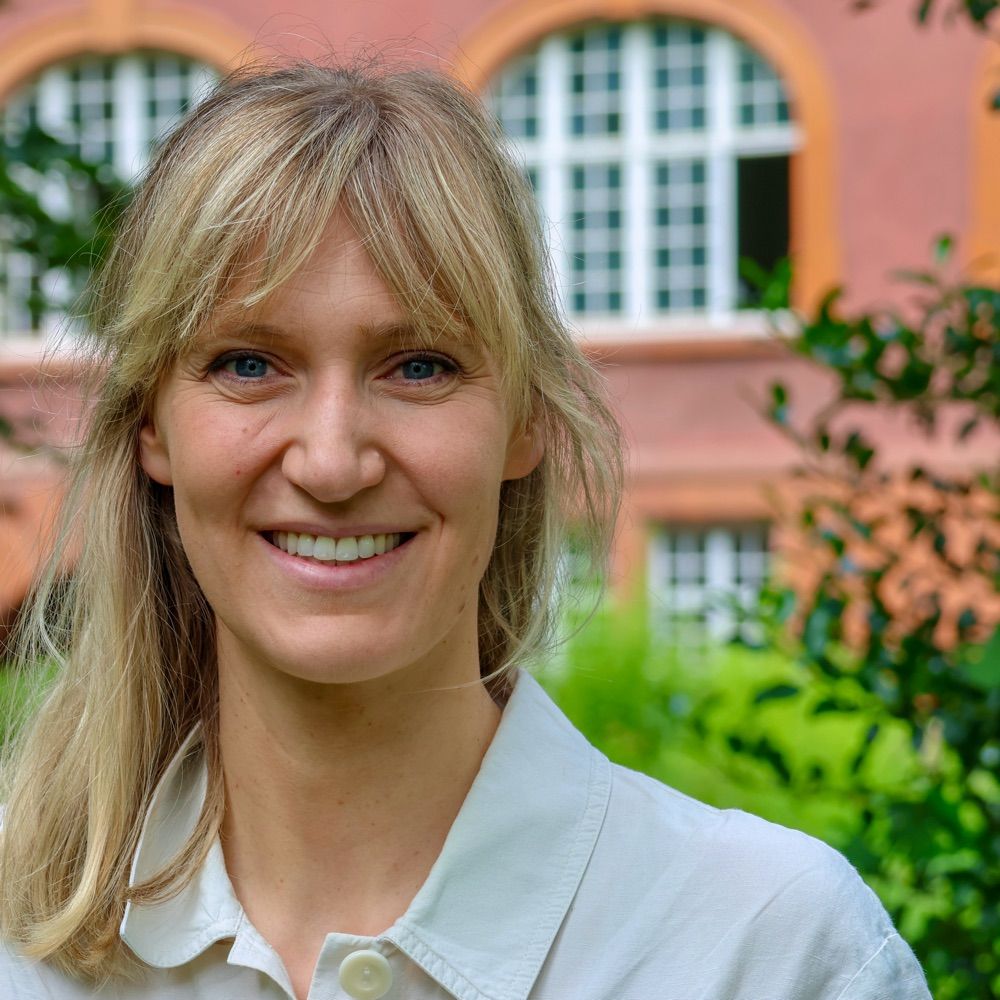 Katharina Schröer (@katharinaschroeer.bsky.social) reposted
Katharina Schröer (@katharinaschroeer.bsky.social) reposted
EGU-goers, make this 🧨session happen with us at #EGU25 @eurogeosciences.bsky.social and explain your research in just the 1000 most common English words. The first European edition of the Up-Goer 5 challenge 🚀🚀 is a comms session so you can submit an extra abstract blogs.egu.eu/geolog/2024/...
 Lukas Brunner (@lukasbrunner.bsky.social)
Lukas Brunner (@lukasbrunner.bsky.social)
Can recommend!
 Lukas Brunner (@lukasbrunner.bsky.social) reposted
Lukas Brunner (@lukasbrunner.bsky.social) reposted
Now that we're all here 🫠 I want to invite you to something totally different at next years #EGU @eurogeosciences.bsky.social: The Upgoer Five Challenge! 🚀 Explain your research using only the 1000 most common words. Join us, it will be tons of fun & interesting! blogs.egu.eu/geolog/2024/...
 Lukas Brunner (@lukasbrunner.bsky.social)
Lukas Brunner (@lukasbrunner.bsky.social)
Do you (plan to) use Python in Earth sciences? We have a course for you at next year's #EGU: Introduction to Python for Earth System Sciences We'll cover the classics from matplotlib to xarray but happy for suggestions, just comment below! meetingorganizer.copernicus.org/EGU25/sessio...
 Lukas Brunner (@lukasbrunner.bsky.social) reply parent
Lukas Brunner (@lukasbrunner.bsky.social) reply parent
Yes! It's a communication session, so you can submit another abstract
 Lukas Brunner (@lukasbrunner.bsky.social)
Lukas Brunner (@lukasbrunner.bsky.social)
Now that we're all here 🫠 I want to invite you to something totally different at next years #EGU @eurogeosciences.bsky.social: The Upgoer Five Challenge! 🚀 Explain your research using only the 1000 most common words. Join us, it will be tons of fun & interesting! blogs.egu.eu/geolog/2024/...
 Lukas Brunner (@lukasbrunner.bsky.social)
Lukas Brunner (@lukasbrunner.bsky.social)
I'm thrilled to join Jana Sillmann's group @uni-hamburg.de in May! Looking forward to many new and exciting projects and collaborations 🥳 Huge thanks to @aikovoigt.bsky.social and the whole team @univie.ac.at for a great time and all the things I could learn! Very sad to leave 🫶
 Lukas Brunner (@lukasbrunner.bsky.social) reply parent
Lukas Brunner (@lukasbrunner.bsky.social) reply parent
Many thanks to the entire team for this collaborative effort! In a sense, this study was a follow-up of earlier work where we compared a similar set of methods but could not make statements about their skill. So its really great to see this come together now! doi.org/10.1175/JCLI...
 Lukas Brunner (@lukasbrunner.bsky.social) reply parent
Lukas Brunner (@lukasbrunner.bsky.social) reply parent
Finally, we also apply all five methods and the multi-method to real observations and use them to constrain projections of European temperature changes between 1995-2014 and 2041-2060 👇👇 6/🧵
 Lukas Brunner (@lukasbrunner.bsky.social) reply parent
Lukas Brunner (@lukasbrunner.bsky.social) reply parent
For precipitation and in winter method skill is much more of a mixed bag with only few consistent skill improvements compared to the unconstrained case. Constraining precipitation on a regional scale should therefore be treated with some caution. 👉 rdcu.be/dFXv5 5/🧵
 Lukas Brunner (@lukasbrunner.bsky.social) reply parent
Lukas Brunner (@lukasbrunner.bsky.social) reply parent
Main takeaway: for summer temperature changes the methods are very consistent even though they base their constraints on quite diverse information. Combining them into a multi-method constraint that can draw on all available information also shows some promise. 4/🧵
 Lukas Brunner (@lukasbrunner.bsky.social) reply parent
Lukas Brunner (@lukasbrunner.bsky.social) reply parent
It was quite an effort to achieve a consistent comparison of five very different constraining methods using 125 (!!) pseudo-observational datasets. Huge thanks to Chris O'Reilly for leading this!! See below to get an idea of the amount of data involved. 3/🧵
 Lukas Brunner (@lukasbrunner.bsky.social) reply parent
Lukas Brunner (@lukasbrunner.bsky.social) reply parent
The idea is simple: provide each participating group with historical CMIP6 model runs, serving as pseudo-observations used to constrain CMIP5 projections. The constrained distribution is then compared against the withheld "truth" in the future. 2/🧵
 Lukas Brunner (@lukasbrunner.bsky.social)
Lukas Brunner (@lukasbrunner.bsky.social)
(How) can we show the skill of constraining future projections? Model-as-truth tests have been used in the past but only for individual methods. We develop an extensive & consistent testing framework and apply it to five (!) constraining methods. 1/🧵 doi.org/10.1038/s416...
 Lukas Brunner (@lukasbrunner.bsky.social)
Lukas Brunner (@lukasbrunner.bsky.social)
Täglich an Hitzewellen und ihren Änderungen zu forschen macht es irgendwie abstrakt. Wenn ich dann darüber in der Zeitung lese wirds plötzlich wieder sehr real 🥵🥵🥵 (Studie von Philipp Aglas-Leitner in prep) www.derstandard.at/story/300000... @eurogeosciences.bsky.social
 Lukas Brunner (@lukasbrunner.bsky.social)
Lukas Brunner (@lukasbrunner.bsky.social)
If you're at @eurogeosciences.bsky.social 2024 you can hear me talk about this on Wednesday afternoon: meetingorganizer.copernicus.org/EGU24/EGU24-... I've uploaded the presentation as supplementary material if you can't join the talk. Also, feel free to reach out if there are any questions.
 Daniel Huppmann (@danielhuppmann.bsky.social) reposted
Daniel Huppmann (@danielhuppmann.bsky.social) reposted
The #Energy #Climate & #Environment program at #IIASA is looking for an #IntegratedAssessment modeler to join the #MESSAGEix team! Come work with us on policy-relevant scenarios and state-of-the-art #opensource #ScientificSoftware tools... 📝 iiasa.ac.at/employment/j... 🔌💡
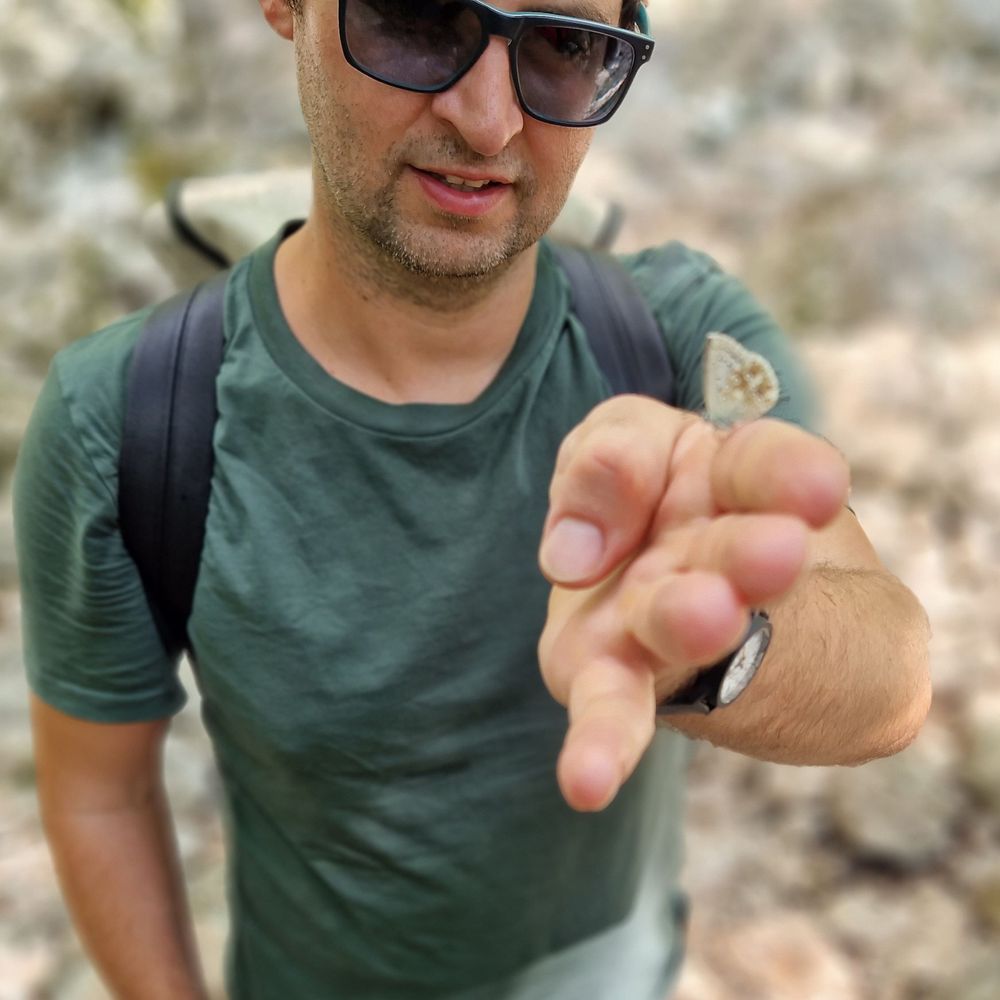 Benedikt Narodoslawsky (@dernaro.bsky.social) reposted
Benedikt Narodoslawsky (@dernaro.bsky.social) reposted
Vor der ÖVP-Parteizentrale forderten heute rund 100 Wissenschafter:innen von der ÖVP Klimapolitik auf Basis von Fakten. at.scientists4future.org/2024/04/04/1...
 Lukas Brunner (@lukasbrunner.bsky.social)
Lukas Brunner (@lukasbrunner.bsky.social)
Guter Artikel in der @diepressecom.bsky.social über unsere Studie zu einem Fehler in der Definition von Hitzeextremen: www.diepresse.com/18290185/irr...
 Lukas Brunner (@lukasbrunner.bsky.social) reply parent
Lukas Brunner (@lukasbrunner.bsky.social) reply parent
Full thread about the paper here: bsky.app/profile/luka...
 Lukas Brunner (@lukasbrunner.bsky.social) reply parent
Lukas Brunner (@lukasbrunner.bsky.social) reply parent
Without a seasonal cycle, there is never any problem. With seasonal cycle we achieve ~10% with very short windows or very long windows (but only in summer - see last post). In between there is a minimum - depending on the seasonal cycle strength.
 Lukas Brunner (@lukasbrunner.bsky.social)
Lukas Brunner (@lukasbrunner.bsky.social)
One of the more educational figures from our new study that I really like is hidden in the supplement: effect of ever longer running windows on the extreme frequency using 5000 bootstrap samples of auto-correlated white noise. Paper: doi.org/10.1038/s414...
 Lukas Brunner (@lukasbrunner.bsky.social) reply parent
Lukas Brunner (@lukasbrunner.bsky.social) reply parent
Mehr Details in der Pressemitteilung der @univie.ac.at oder auf Anfrage. medienportal.univie.ac.at/media/aktuel...
 Lukas Brunner (@lukasbrunner.bsky.social) reply parent
Lukas Brunner (@lukasbrunner.bsky.social) reply parent
Der Ursprung des Fehlers liegt in der Interaktion zwischen dem Jahresgang der Temperatur und dem gleitenden Zeitfenster. Daher sind Jahreszeiten mit starkem saisonalen Änderungen, wie Frühling und Herbst, besonders starkt betroffen. 3/🧵
 Lukas Brunner (@lukasbrunner.bsky.social) reply parent
Lukas Brunner (@lukasbrunner.bsky.social) reply parent
Die Stärke des Fehlers hängt von verschiedenen Eigenschaften ab, die sich je nach Region verändern. Daher variieren auch die Auswirkungen geographisch sehr stark. Das kann insbesondere zu Problemen führen wenn Hitzewellen zwischen verschiedenen Regionen der Welt verglichen werden. 2/🧵
 Lukas Brunner (@lukasbrunner.bsky.social)
Lukas Brunner (@lukasbrunner.bsky.social)
🚨 Fehler in einer häufig verwendeten Metrik zur Detektion von Hitzewellen enteckt! In unserer Studie in Nature Communications zeigen wir, dass relative Temperaturextreme (sogennante TX90p Events) unterschätzt werden. Der Grund dafür sind zu lange gleitende Zeitfenster. 1/🧵 doi.org/10.1038/s414...
 Lukas Brunner (@lukasbrunner.bsky.social)
Lukas Brunner (@lukasbrunner.bsky.social)
Press release by @univie.ac.at about the paper here: medienportal.univie.ac.at/en/media/rec...
 Lukas Brunner (@lukasbrunner.bsky.social) reply parent
Lukas Brunner (@lukasbrunner.bsky.social) reply parent
We have made the code used in the study free to use: github.com/lukasbrunner... Example data are here: doi.org/10.5281/zeno... #openaccess #openscience 🧵/END
 Lukas Brunner (@lukasbrunner.bsky.social) reply parent
Lukas Brunner (@lukasbrunner.bsky.social) reply parent
Many thanks to my co-author Aiko Voigt (@aikovoigt.bsky.social), and to Erich Fischer (@erichfischer.bsky.social) and Gabi Hegerl for their input! Thanks also for the helpful comments from three anonymous reviewers and the editor Efi Rousi (@efou.bsky.social) ! 🙏🙏🙏 10/🧵
 Lukas Brunner (@lukasbrunner.bsky.social) reply parent
Lukas Brunner (@lukasbrunner.bsky.social) reply parent
What about problems in already published results? We focus on the methodological error and its *potential* implications - not on errors in individual studies. For many studies, the impact might be small as other factors dominate but we encourage people to check! 9/🧵
 Lukas Brunner (@lukasbrunner.bsky.social) reply parent
Lukas Brunner (@lukasbrunner.bsky.social) reply parent
Conclusion: don’t use long seasonal windows in the calculation of extreme threshold without correction! The bias might not obviously show in derived metrics but could still lead to 👉 Pitfalls in diagnosing temperature extremes 👈 8/🧵 doi.org/10.1038/s414...
 Lukas Brunner (@lukasbrunner.bsky.social) reply parent
Lukas Brunner (@lukasbrunner.bsky.social) reply parent
How to eliminate the bias? Only using short windows also comes with problems (see paper for a discussion). We propose to remove the mean seasonal cycle before the percentile calculation. Result: the bias is all but gone 💪 7/🧵
 Lukas Brunner (@lukasbrunner.bsky.social) reply parent
Lukas Brunner (@lukasbrunner.bsky.social) reply parent
Derived metrics such as heatwaves are also affected. We show that the bias also impacts changes in land heatwaves during the warm season as a more impact-focused metric 👇👇 6/🧵
 Lukas Brunner (@lukasbrunner.bsky.social) reply parent
Lukas Brunner (@lukasbrunner.bsky.social) reply parent
The bias weakens with global warming (see paper for details rdcu.be/dBByU) leading to an overestimation of temperature extreme changes. 10% expected baseline frequency -> max. increase x10 -> 100% extremes in the future. In the biased case 👇 the ratio can exceed x13! 5/🧵
 Lukas Brunner (@lukasbrunner.bsky.social) reply parent
Lukas Brunner (@lukasbrunner.bsky.social) reply parent
Since the seasonal cycle varies across the globe, so does the bias. In some regions, the annual extreme frequency is close to the expected 10%, and in others only 5% (-50% bias). This undermines a fair comparison of extremes and derived heatwave metrics between regions. 4/🧵
 Lukas Brunner (@lukasbrunner.bsky.social) reply parent
Lukas Brunner (@lukasbrunner.bsky.social) reply parent
Running seasonal windows are often used to increase the sample size for the percentile calculation. Many studies use 15- or even 31-day windows, inadvertently mixing seasonal gradients into the threshold. As a result, the extreme frequency is systematically biased low! 3/🧵
 Lukas Brunner (@lukasbrunner.bsky.social) reply parent
Lukas Brunner (@lukasbrunner.bsky.social) reply parent
TX90p is defined relative to the TX 90th percentile at each location & across the seasonal cycle. (Implicit) assumption: ~10% of days are extreme (in sample) regardless of region and season. We show that this assumption often does not hold and discuss implications. 2/🧵
 Lukas Brunner (@lukasbrunner.bsky.social)
Lukas Brunner (@lukasbrunner.bsky.social)
🚨 New paper in @NatureComms We show that relative temperature extremes (TX90p) as used in many studies can be biased by as much as 50%! The bias arises from the use of too long seasonal windows and can easily be corrected. Details below 1/🧵 doi.org/10.1038/s414... 🧪
 Lukas Brunner (@lukasbrunner.bsky.social)
Lukas Brunner (@lukasbrunner.bsky.social)
Are you planning to come to EGU24? Do you love to talk about your research? We have some fun for you: join our Up-Goer Five session and explain your work using only the 1000 most used words in English! 🥳 More here: blog.univie.ac.at/en/research/... @eurogeosciences.bsky.social @univie.ac.at 🧪
 Robb Jnglin Wills (@robbjnglinwills.bsky.social) reposted
Robb Jnglin Wills (@robbjnglinwills.bsky.social) reposted
Less than a week to submit an abstract for #EGU24. If you work on understanding the contributions of internal variability and forced responses to historical or future climate change and climate impacts (e.g., using large ensembles), then please consider submitting to our session!
 Lukas Brunner (@lukasbrunner.bsky.social) reply parent
Lukas Brunner (@lukasbrunner.bsky.social) reply parent
Check this out for some inspiration: www.youtube.com/watch?v=lxWr...
 Lukas Brunner (@lukasbrunner.bsky.social) reply parent
Lukas Brunner (@lukasbrunner.bsky.social) reply parent
Where it all started: xkcd.com/1133 🚀
 Lukas Brunner (@lukasbrunner.bsky.social)
Lukas Brunner (@lukasbrunner.bsky.social)
We have a new thing for you at EGU24 (the meeting of the old land group for work on the outside world 🤓🤪): explain your work using only the ten hundred most used words! Join us it will be fun! @eurogeosciences.bsky.social meetingorganizer.copernicus.org/EGU24/sessio...
 Lukas Brunner (@lukasbrunner.bsky.social)
Lukas Brunner (@lukasbrunner.bsky.social)
We are super excited to have Stefan Sobolowski as a solicited speaker in our session!! So yet another great reason to join us! 🤓 @eurogeosciences.bsky.social 🧪
 Lukas Brunner (@lukasbrunner.bsky.social)
Lukas Brunner (@lukasbrunner.bsky.social)
Don’t forget the EGU24 abstract deadline early 2024 (Jan. 10th)! If you're working on constraining of climate models, GCM sub-selection (for regional models), reliability of climate projections, or related topics consider submitting to our session: meetingorganizer.copernicus.org/EGU24/session/ 🧪
Lukas Brunner (@lukasbrunner.bsky.social)

